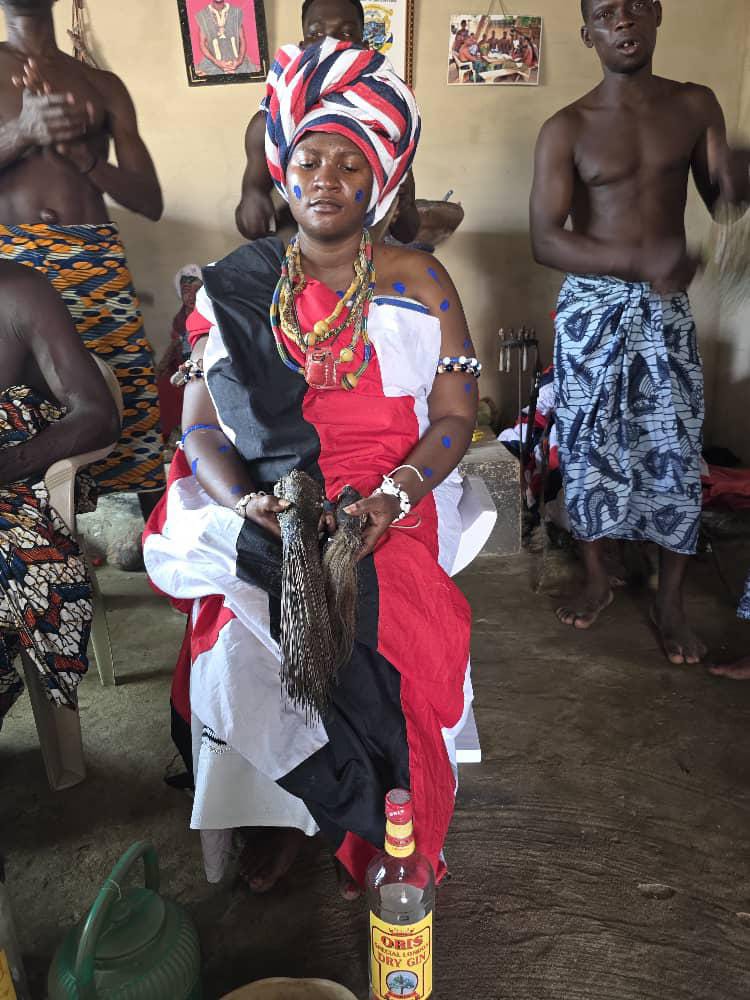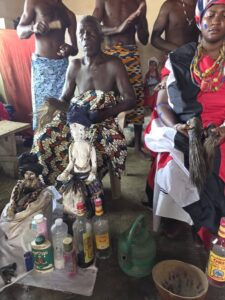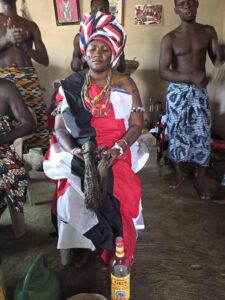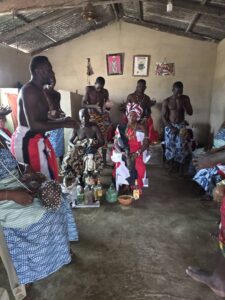
Judith Boateng, a Christian mother of three, recounts her harrowing ordeal of being forcibly chosen as a traditional priestess against her will—sparking a fight for religious freedom, safety, and justice.
In the quiet village of Abream in Ghana’s Kwabre District, a centuries-old tradition collided with the rights and freedoms of a modern woman—and the fallout has turned her life into a nightmare.
Judith Boateng, a 31-year-old beautician, wife, and mother of three, is fighting for her life, her family, and her faith after being forced into a role she neither accepted nor believes in: a spiritual marriage to the gods of her ancestral village.
The practice, known locally as enstoolment, is a customary rite in some Ghanaian communities where elders select a successor to serve as a priest or priestess (Okomfuo) after the death of a spiritual leader. The role is often portrayed as a sacred calling. But for Boateng, it became a personal and human rights crisis.
“It all began in October last year, after the death and burial of the town’s priestess—my maternal relative,” Boateng told reporters from a safe location. “In November, I was informed that the elders, after consulting the spirits, had selected me as the next Okomfuobaa of Abream/Kwabre District. They said I had no choice in the matter.”
Boateng, who lives in the city with her husband Kwaku Agyei and their three children—Micah (15), Keran (10), and Zowie (2)—rejected the decision on religious, ethical, and personal grounds.
“As a Christian and a devoted wife and mother, I made it clear that I could not abandon my family and faith to engage in rituals that include libation, animal sacrifices, and a lifetime of serving deities I don’t believe in,” she said.
Her refusal was not taken lightly.
“The elders warned that I would bring curses upon myself and my entire family if I resisted,” she explained. “They told me it wasn’t about interest or consent—it was destiny, and there was no way out.”
Despite reporting the threats to local police, Boateng said authorities took no action until the situation escalated into a full-blown abduction. In her husband’s absence, while he was away on work in Kumasi, Boateng was kidnapped by members of her own extended family—including her brother—and forcibly taken to a shrine to begin the initiation process.

“It was terrifying. I was overpowered, taken by force, and told this was now my life,” she recalled.
Fortunately, a tip-off alerted her husband to the unfolding events. He returned to the village with the police, managing to rescue her just in time. Her brother was arrested, and the case was documented, but peace has remained elusive.
Since then, the family has become a target of intimidation and violence. Community members aligned with the shrine have allegedly issued death threats, assaulted her husband, and vandalized their home. The situation has made everyday life unbearable.

“We are living in constant fear,” Boateng said. “My husband was beaten by shrine supporters. Our house was attacked. The police say it’s a cultural and religious issue and that their hands are tied.”
Meanwhile, their children’s education has suffered. The family is in hiding, unable to return to their normal lives due to fears of further attacks or even the possibility that their children could be taken to force compliance.
“This has ruined everything,” she said, her voice breaking. “We are cut off from our work, our home, our dreams. We don’t feel safe anywhere. We don’t know who to trust.”
Legal experts and human rights advocates are now paying closer attention to such cases, which highlight the tension between traditional beliefs and individual rights in Ghana’s pluralistic society. While Ghana’s constitution guarantees freedom of religion and personal autonomy, enforcement remains inconsistent—especially in rural areas where customary authority often outweighs legal structures.
Human rights groups have condemned the practice of forced religious roles and so-called “spiritual marriages,” labeling them as violations of religious freedom and personal liberty.
“This is not just a religious issue—it’s a human rights issue,” said one local advocate familiar with the case. “Nobody should be forced into a religious role against their will, especially under threat of violence or spiritual coercion. The state has an obligation to protect its citizens.”
Boateng and her husband are now calling for justice, not just for themselves but for anyone caught in the crossfire of outdated customs and personal freedoms. They are seeking legal protection, public awareness, and government intervention.

“We want the world to hear our story,” she said. “We are not disrespecting culture, but culture must not be used to enslave. I am not property. I am a wife, a mother, and a citizen with rights.”
As they navigate an uncertain future, the Boateng family remains hopeful that their story will spark change—and prevent others from enduring similar suffering.
For now, though, they live in hiding, clinging to faith, family, and the hope that justice will prevail.

